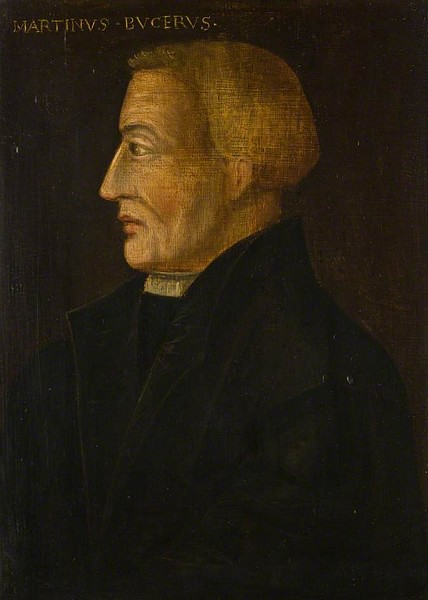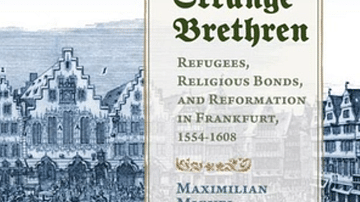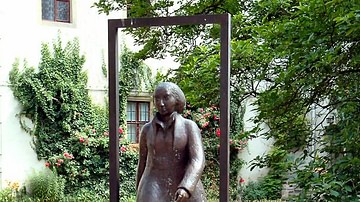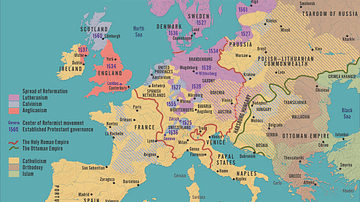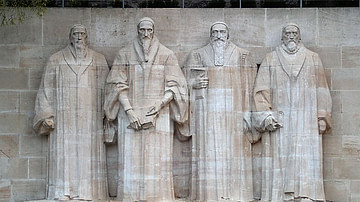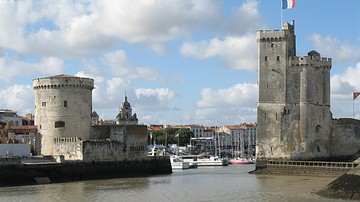In the 16th century, German cities and territories welcomed thousands of refugees fleeing the religious persecution sparked by the Protestant Reformation. In Strange Brethren: Refugees, Religious Bonds, and Reformation in Frankfurt, 1554-1608, Professor Maximilian Miguel Scholz explores one major destination for refugees—Frankfurt am Main—and underscores how they inspired new religious bonds, religious animosities, and religious institutions. In this interview, James Blake Wiener speaks to him about his title and the unique social climate that pervaded the Hessian city.

JBW: Professor Scholz, thank you so much for speaking with me on behalf of World History Encyclopedia (WHE). When many think of Protestant refugees in the Early Modern Era, their minds usually turn to the plight of Huguenots or Anabaptists. Many of them found refuge in cities like London, Amsterdam, Geneva, and Hamburg. What was it that first attracted you to the history of 16th-century Frankfurt am Main? Moreover, what differentiated Frankfurt am Main from other Protestant cities within the Holy Roman Empire?
MS: Frankfurt hosted thousands of refugees in the 16th century. It still does today! But the city is often overlooked because the documents pertaining to its 16th-century experience of refugee accommodation were destroyed by the U.S. and British militaries in 1944. I wanted to shine new light on Frankfurt’s centrality in the story of Protestant refugees. Frankfurt lay at the center of Germany, which it still does today. It was also the symbolic capital of Germany, where the Holy Roman Emperors were elected and crowned. (After the Second World War, there was a push to make Frankfurt the capital of Germany once more.) Frankfurt was the transportation hub of Germany then as it still is now. If we want to understand how refugees impacted German society, Frankfurt is the ideal place to start. Beyond its prominence in Germany, Frankfurt was different from other German cities because its Reformation had followed the lead of Martin Bucer rather than Martin Luther (though of course Frankfurters loved Luther too). Bucer had advocated for reforms that fell somewhere between the later Calvinist and Lutheran camps.

JBW: Repeated bombing by British and American air forces destroyed many of Frankfurt’s churches and archives in 1944. If I’m not mistaken, Frankfurt was formerly the largest half-timbered city center in Germany too, so a great deal was lost in a very short period of time. Could you comment on the tremendous hurdles you and fellow scholars face in researching Frankfurt am Main’s Early Modern history as a result?
MS: Yes, Frankfurt’s archive suffered grievously. The archive’s director believed the Nazi fantasy that Germany was impervious to assault, so he did not protect the archive’s treasures by moving them underground. Thus, the bombings of 1944 destroyed about 70% of the archive’s holdings, including the Acta Ecclesiastica, which documented the birth of Protestantism in Frankfurt. Historians interested in the religious changes of the 16th century need to use either non-civic sources (like the records of the Dutch and French Reformed communities in Frankfurt, which were not housed at the archive) or reproductions of the original sources, which can be found in the appendices of many pre-WWII histories of Frankfurt. My book relied on documents from an imperial court case in 1720. The Dutch and French Reformed (i.e. Calvinists) sued the city of Frankfurt at the imperial supreme court, and both the sides collected and printed documents from the Reformation that they believed helped their case.
JBW: Frankfurt am Main received French-, Dutch-, and English-speaking Protestant
refugees throughout the 1550s, 1560s, and 1570s. Many of the earliest refugees were the so-called “Marian exiles.” Who were these early exiles, what brought them to Frankfurt am Main, and how long did they stay in Hesse?
MS: These exiles were the earliest Protestants (though they did not call themselves that), and they were fleeing Catholic rulers. The point of contention was the Catholic mass. The refugees in my book refused to attend the Catholic mass, because they rejected the idea that a priest could perform a ritual on an altar that would summon forth the actual body of Jesus. These people considered this idolatrous and believed the mass should be replaced by a simplified eucharist, which would focus on the Bible and memorialize the Last Supper. The Catholic authorities began to violently persecute those who did not attend the mass, and these early Protestants faced a choice: be martyred at home or flee abroad. Thousands fled to Frankfurt, which as an independent city (it was not then part of Hesse) could rule its own religious affairs, to an extent. In the case of English Protestants fleeing the Catholic Queen Mary I of England (the Marian exiles), they returned when she died and was replaced by the Protestant Queen Elizabeth I of England. Thus, they were in Frankfurt for just five years. Other refugees from the Low Countries settled in Frankfurt and have descendants who still live in the city.
JBW: Professor Scholz, how did Lutheran elites and ordinary citizens in Frankfurt am Main first react to the presence of Calvinist refugees? What subsequently changed over the next few decades?
MS: At first, they welcomed them. They considered these newcomers brethren, who had suffered under the cruel rule of tyrannical Catholics like Charles V and Mary Tudor. But it proved difficult to live alongside these newcomers, many of whom were richer than the citizens of Frankfurt. When Frankfurters witnessed the church services of the refugees, they realized that these people practiced Christianity differently. Frankfurters were scandalized that the refugees took the bread of the eucharist into their own hands. And they were further disgusted that the refugees brought their screaming children with them into the churches. Frankfurt’s pastors were the first to turn on the newcomers, demanding that they conform to Frankfurt’s ritualistic practices or leave the city. The pastors whipped up a popular hatred of the refugees.
JBW: I think some readers who are relatively unfamiliar with the history of the Protestant Reformation may be surprised to learn about the high degree of confessional strife and rivalry between Calvinists and Lutherans. Could you thus explain to us how officials in Frankfurt am Main ultimately circumscribed Calvinist worship and freedom?
MS: The refugees and native Frankfurters split into two religious camps that we now call Calvinist (they called themselves Reformed) and Lutheran (they called themselves Evangelical), and this division became violent at times. For Americans, living in a country that has separated religion from government, it can be hard to imagine how little differences in worship or belief could have resulted in legal trouble, expulsion, or worse. Once Frankfurt’s leaders concluded that the refugees were “Calvinists” they banned them from applying for citizenship and closed their churches. Periodic riots against the refugee community resulted in deaths and the burning down of a small chapel the Reformed had built outside the city wall.
JBW: How would you characterize the Calvinist refugees’ religious and civic impact upon Frankfurt am Main? Can we still detect their legacy in the city today?
MS: They enriched Frankfurt enormously by bringing in goods and industry from the Low Countries. The Low Countries were the most industrially advanced part of Europe, and the Protestants who fled places like Antwerp took their industrial know-how with them into German cities like Frankfurt. And when Frankfurt began to harass these newcomers, they settled in little towns outside of Frankfurt, towns which became (and still are) hubs of industry, like Hanau and Offenbach.

JBW: What lessons can we draw from the experiences of the Calvinist refugees in Frankfurt am Main that could perhaps be applied to our own era?
MS: Welcoming, resettling, and integrating refugees into a city can be very difficult and may provoke problems that persist for generations. But it is not impossible. The internal cultural organizations of a refugee community (like the Calvinist consistory in 16th-century Frankfurt) can help facilitate financial support for refugees, management of their affairs, and integration into the host city. We need to confront the reality that it may take generations for refugees and their descendants to embrace (and be embraced by) host societies.
JBW: Professor Scholz, thanks so much for your time and consideration! I wish you many happy adventures in writing and research.
MS: Thank you so much for your questions.

Biographical précis:
Professor Maximilian Miguel Scholz specializes in the social and religious history of early modern Europe and teaches at Florida State University. His first book, Strange Brethren: Refugees, Religious Bonds, and Reformation in Frankfurt, 1554-1608 (University of Virginia Press, 2022) explores the fate and impact of Reformation refugees by looking at one center of European refugee life, the city of Frankfurt am Main. His second book, tentatively titled The Great Refugee Realignment: How Forced Migrants Transformed Government in Northern Europe, 1550-1750 uses refugee treaties collected from archives across Europe to illuminate the ways refugees transformed governments, stimulating the growth of centralized bureaucracies and contributing new ideas about political membership and new systems for managing religious, ethnic, and migration-status diversity.


